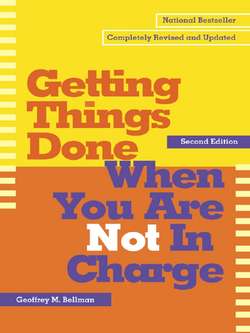Читать книгу Getting Things Done When You Are Not in Charge - Geoffrey M Bellman - Страница 3
На сайте Литреса книга снята с продажи.
INTRODUCTION
You Are Not In Charge
ОглавлениеWe succeed by helping others succeed; our accomplishment is dependent on theirs. In our more expansive moments, we might say that we make them successful. In their more generous moments, they might say that they couldn’t do it without us. We are often in-between, wondering how best to contribute and how much difference we make. Some of us get trapped “on hold,” waiting for the authority, waiting for others to tell us what to do. That does not work.
Our only chance for contributing is to quit waiting and wondering and do something. We serve ourselves and others best when we do not wait. Initiate, with the organization and all involved people in mind. No, we are not in charge but we can act. No, we are not formally designated leaders, but we can lead. This book will help you think of yourself as a leader, as someone who helps an organization, its people, and resources move in new directions. Yes, right from where you are, not waiting until you’ve moved into a more powerful position. Whether you are an individual contributor, a middle manager, a school principal, or a precinct chair, there is much you can do from your position right there in the middle of things. Whether you are an entering programmer, a journeyman mechanic, a PTA parent, or a social worker, you can choose to lead others. And, the first step in leading others at work is leading your own life.
The Illusion: Someone Is in Charge
Many of us grew up with the expectation that someone will watch over us, take care of us, be “in charge,” “know best,” and that this will turn out okay. Our families, schools, communities, and organizations taught us to believe this, but their teachings began to fray pretty early, usually before we became adults. Our contradictory experience confused us; we saw people “in charge” producing very mixed results. The people in position to “do what’s best” disappointed us. Programs they created, decisions they made, did not turn out okay – at least not for us and what we wanted out of our lives. We discovered that they would not watch over us. An extremely hard part of this learning is not our disappointment in them but our struggles with our own responsibility: If they are not in charge, who is? If I cannot count on them, who can I count on? What is my responsibility in helping my family, my community, my employer, or this world? What can I, what will I, do with my life? These are the big questions lurking behind the work questions we struggle with daily.
You may be thinking, “But someday I will be in charge of that committee (or agency or division or team) and I will
